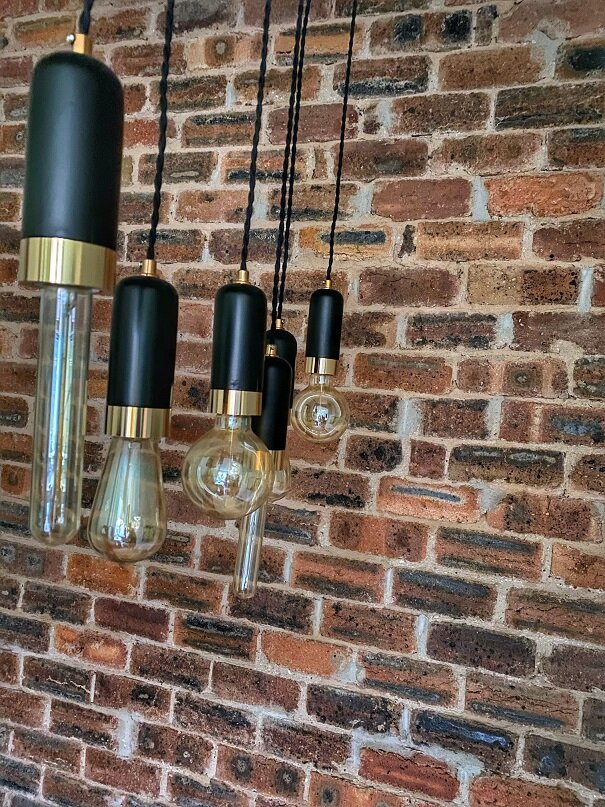5 Simple DIY Lights to Add Character to your Home
1.
This light takes pride of place above the island in my kitchen. I was inspired by a similar light that I had seen in a restaurant so I decided to make it myself. I drew a sketch to help me figure out which pipe components I would need. I used steel pipe, which is very heavy. Initially, I wanted the cable hidden but there was already a hole in the middle of the ceiling above the island so, I decided to have a centre rose with the cables feeding into each bulb. It needed four legs to act as supports to hold the weight and get a secure fixing. I then added a few racks (to hold wine glasses) and attached them with cable ties. I had an electrician wire it for me. It was very simple putting this together. You just screw the pipe into the components using grub screws and an allen key.
2.
I used a similar concept with this light above the dining table. I made a bar out of steel pipe and screwed it to the ceiling, either side of the rose. The ceiling rose has six outlets, meaning that six cables can come out of one place. I bought six individual lights that were attached to their own gold ceiling rose. So, I cut them from the original rose and the electrician wired them into one. I really liked the bulb holders on these lights and they were on sale so I just improvised to create the look I wanted. This light is on a dimmer switch so I can play around with mood lighting in the dining nook.
3.
When interior designers refer to a ‘drum’ shade this isn’t exactly what they’re talking about. So I may have taken it a little too literally. However, there was an underlying music theme going on in this room so it was appropriate. The light was made from a kiddy toy set. I connected the drums as normal, ripped out the bottom lining and drilled holes into the top for the bulb holders. I attached some chains to hold the whole thing up then added the cymbal to the bottom.
4.
This pulley was a vintage shop find. I thought about using it at home, in Glasgow, since it’s more industrial rather than cottage-y, but I also didn’t want the holiday cottage to be cliché so I decided to use it over the dining table there. Also, I bought it in Crieff, which is where the cottage is located so it only made sense. I attached some rope and threaded the wire through the pulley, then the electrical components were added. I sourced a ceiling rose with two outlets for the two wires, plus, it had a hook so I could easily hook the rope onto it.
5.
When we decided to rip down the ceiling in the hallway of the holiday cottage to reveal the original beam, I instantly thought that it needed to be highlighted somehow. Before, there was only one light on each landing. I had to plan the dimensions meticulously for this one. I didn’t want to be short on cable but it isn’t the easiest place to reach! I chose a six outlet ceiling rose and some grey, wool flex. The lights imitate the pitch of the stairs, gradually getting shorter as you climb higher. I had to use a pole to adjust some of the loops to get an even spacing. Now, the hallway is not just a narrow, boring space, but an interesting feature.
My lighting top tips:
Be creative. If you need a lamp but like the look of a ceiling light then improvise; turn it into a lamp. Even chandeliers can sit beautifully on a sideboard – nothing is too bizarre as far as I’m concerned!
Play with what you have available. Think about how you can use existing features and accentuate them with lighting. For example, add LED lighting strips on beams or in alcoves.
Make sure your bulbs comply. If you have a dimmer switch installed then check that the bulbs you have are dimmable, otherwise they can cause damage to the lamp or circuit.


















